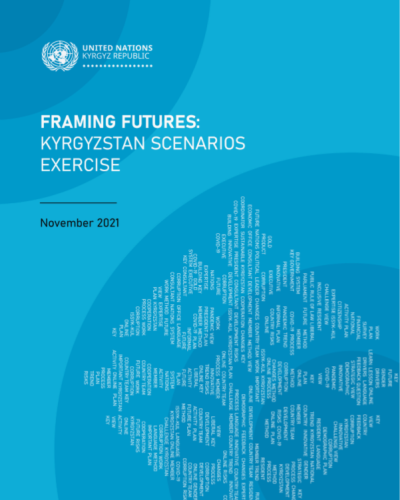Framing Futures: Kyrgyzstan Scenario Planning

The number of acronyms and metaphors to reflect the uncertainty of our times is growing every day - “VUCA” (volatile, uncertain, complex, ambiguous), ‘post-normal’, ‘black swans’ – are just some of them. We live in the world of less ‘control and management’ and of more humility and acceptance of our ignorance and wider range of risks, in times of evaporated ‘normalcy’. Working on the UN’s 5-year Cooperation Framework in the country we are asking ourselves, how decisions about priorities can be made in these ambiguous times, how we can navigate through so many global, regional, national, and sub-national risk drivers and actors.
We decided to delve into foresighting to gain more understanding of what is going around us so that we can plan much better the UN’s response and contribution to Kyrgyzstan’s development. Through a three-day scenario analysis and planning workshop, we came to understand foresight better – it is not a forecast, nor a prediction, and certainly not a plan. Foresighting is about building a story of plausible futures, and a deep understanding of forces and drivers behind these futures. The foresight workshop for the UNCT in the Kyrgyz Republic was primarily a learning experience, that brought the UN and external experts together, to think different, collectively, and beyond individual agency mandates. The results were surprising, seemingly ‘crazy’ and ‘fantastic’, and the process was painful. However, if you feel too comfortable during a scenario analysis and planning exercise, you are probably doing it wrong. The scenarios exercise aimed to undermine the perceptions of ourselves and of others, to discover the most important drivers and uncertainties out of the hundreds of factors that impact our work in the country. Scenarios if used consistently become a toolkit for thinking and planning, to strategize and be open and reflexive of the changing context.
We used the scenario analysis and planning exercise, together with the evaluation report of our UN Development Assistance Framework (which is in its penultimate year of implementation) and the report of our Common Country Analysis as foundational instruments to inform our strategic thinking and planning, as we begin discussions with the government and other national stakeholders towards framing our next UN Sustainable Development Cooperation Framework (UNSDCF) for 2023-2027.
We hope our experience and this report will help other UN offices to apply the methodology and to advance strategic thinking in the organization. Foresight is becoming an especially important tool in the context of the UN reform, when agencies, funds and programmes need to work in a more integrated, coherent and coordinated manner to deliver better and sustainably for the host governments and peoples.
Happy reading,
Ozonnia Ojielo, PhD
UN Resident Coordinator
in the Kyrgyz Republic





















